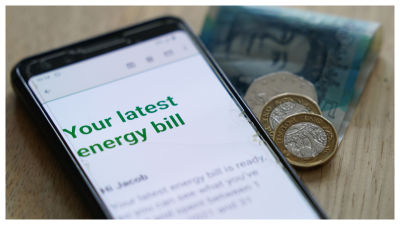Does my landlord have to pass on the £400 energy bills discount? Charity warns renters may miss out

A charity has warned that tenants could miss out on the government’s £400 energy bill discount if their bills are included within the rent they pay.
Currently, around 585,000 renting households have an arrangement whereby their landlord manages their gas and electricity bills, according to a report by Citizens Advice.
The number equates to 13% - more than one in eight - of private renters.
The Citizens Bureau is warning some landlords whose rentals are bills-inclusive may keep the discount, rather than pass the savings onto tenants.
Want a quick and expert briefing on the biggest news stories? Listen to our latest podcasts to find out What You Need To Know
“With predictions that high prices are set to be a feature of the energy market at least until well into next year, this creates fresh urgency to future-proof protections for renters, including ensuring they can control their energy supply, and aren’t subject to practices which exclude them from the market such as sub-metering,” the report said.
However, the Government has said it still expects landlords to pass on the discount.
“In these circumstances, landlords who resell energy to their tenants should pass the discounted payments on appropriately, in line with Ofgem rules to protect tenants,” its official advice says.
At this point the advice does not make explicitly clear how it will ensure tenants receive the benefits from landlords or regulators.
Although it did say that “steps are also being taken to protect consumers from the risk of fraud, gaming, and non-compliance”.
For instance, customers should be notified in writing when they have received the £400 energy rebate from the Government. This should be “clearly shown” on bills or statements for Direct Debit and credit customers.
Suppliers will be expected to report action they take to the Government as a way of communicating the payment has been passed onto consumers.
The energy price cap has been predicted to remain above £3,500 a year throughout 2023, according to the latest forecast from energy consultancy firm Cornwall Insight.
Prices are already at unprecedented levels following an increase of more than 50% to the cap last April.
To help households cope against the growing cost of living the Government has announced a support package, which includes a £400 discount on energy bills.
From October, some 29 million households across England, Wales and Scotland will start to receive the rebate.
A spokesperson from the National Residential Landlords Association (NRLA) pointed out there will also be cases where “bills included” rents have been set without reflecting the recent surge in costs.
The spokesperson said: “In most cases tenants pay their energy bills separately from their rent. As such, they will receive the Government’s support payments directly.
“Where rents include the cost of utilities, and tenants incur the cost of increased energy bills, the savings from the support scheme should be passed on to them.
“However, there will be instances where all-inclusive rents have been set without reflecting higher energy prices.
“The Government needs to ensure that its scheme recognises such cases where it is the landlord who is ultimately paying the cost of increased bills, rather than the tenant.”
Polly Neate, chief executive of Shelter, said: “Tenants whose energy bills are included in their rent or service charge cannot directly claim the energy discount. Instead, they will be at the mercy of their landlord passing on this much-needed support.
“There’s no specific legal obligation for landlords to pass on this support, but they aren’t allowed to overcharge tenants for the energy they’ve used or make a profit on it.
“This could be the case if they pocket the Government support and continue to charge the same rate for utilities.
“Landlords can only charge for energy used, the standing charge and VAT. So, it’s worth making a note of how much energy you’re using to make sure you’re not paying more than you should.
“It is unfair that those at the very sharp end of this crisis could miss out on this much-needed support.”
Residents in Northern Ireland are still awaiting a decision, between the Treasury and ministers in Stormont, to determine how the rebate can be paid there.
The non-repayable payments will be made in monthly instalments over the course of six months, with a £66 discount being applied to energy bills in October and November.
A £67 reduction will then take effect from December to March 2023.
Regardless of whether consumers pay monthly, quarterly or have an associated payment card, they will receive the payment each month.
ITV News has approached Ofgem for comment.